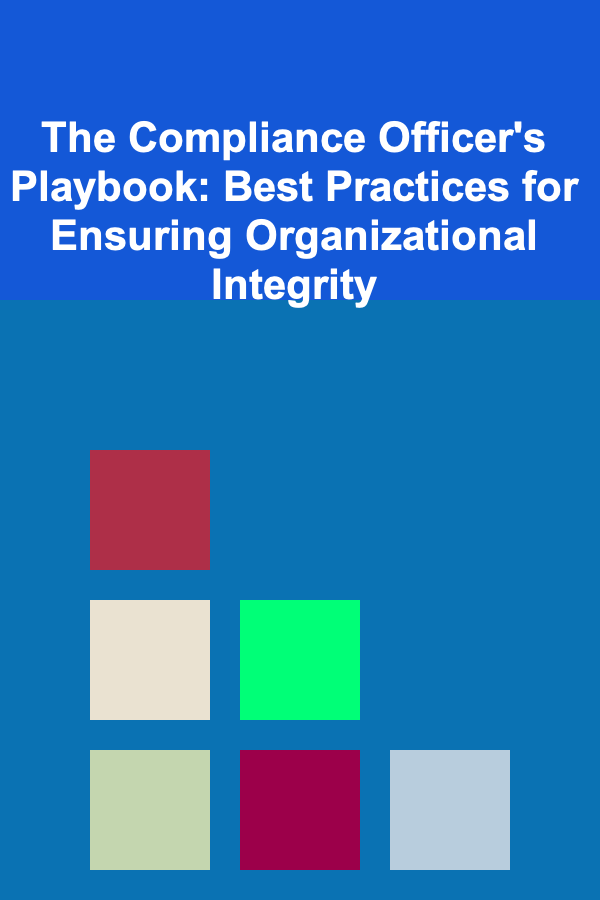
How to Set Up a Checklist for Making the Most of Your Performance Feedback
ebook include PDF & Audio bundle (Micro Guide)
$12.99$11.99
Limited Time Offer! Order within the next:

Performance feedback is an invaluable tool for personal and professional growth. Whether it's delivered by your manager, a peer, or through self-assessment, the feedback you receive can provide critical insights into your strengths, areas for improvement, and opportunities for career advancement. However, simply receiving feedback isn't enough to ensure progress---it's essential to take actionable steps to process it, apply it, and integrate it into your daily work habits.
Creating a structured checklist for making the most of your performance feedback can help you maximize its potential. By following a systematic approach, you can ensure that feedback isn't just a fleeting conversation but a stepping stone toward meaningful growth. This actionable guide will walk you through the steps to build an effective checklist for leveraging performance feedback to its fullest potential.
Prepare for the Feedback Session
Before the feedback session, preparation is key to ensuring that you can receive the information with an open mind and make the most of the opportunity.
Key Actions:
- Reflect on Your Own Performance: Take time to self-assess your performance before the feedback session. Identify areas where you think you've excelled and areas where you might need improvement. This self-awareness can help you approach the feedback with a more open and receptive attitude.
- Set Specific Goals: Have a clear idea of what you want to learn from the feedback. Are there specific skills you want to improve? Are there areas of your work performance you're uncertain about? Setting goals will help you guide the conversation and make it more meaningful.
- Be Ready for Constructive Criticism: Be mentally prepared for both positive and negative feedback. Recognize that constructive criticism is a tool for growth, not a personal attack. Developing a growth mindset beforehand will help you receive feedback more productively.
Actively Listen During the Feedback Session
During the feedback session, your primary focus should be to listen actively. This will allow you to absorb the feedback effectively and ask for clarification when needed.
Key Actions:
- Maintain an Open Body Language: Non-verbal cues are an important part of communication. Make sure to maintain eye contact, nod in acknowledgment, and avoid defensive body language. This will signal to the feedback giver that you're engaged and open to the conversation.
- Don't Interrupt: Give the feedback provider the space to share their thoughts fully. Interrupting can prevent you from hearing the full scope of the feedback and can create a tense atmosphere. Focus on understanding their points before jumping in with your own thoughts.
- Take Notes: Jot down key points during the conversation. This will help you remember specific details and give you something to refer back to when you begin acting on the feedback later.
Ask Clarifying Questions
If you don't fully understand certain aspects of the feedback, don't be afraid to ask clarifying questions. This ensures that you're interpreting the feedback correctly and that you can apply it effectively.
Key Actions:
- Ask for Specific Examples: If the feedback is general, ask for specific examples to understand the context. For example, if your manager tells you that you need to improve communication, ask them to provide specific instances where your communication could have been clearer.
- Request Suggestions for Improvement: While receiving criticism, ask for actionable suggestions that can help you improve. For example, "How can I better manage my time?" or "What specific steps can I take to improve this skill?"
- Summarize and Repeat: To ensure you've understood the feedback correctly, summarize it in your own words and repeat it back to the feedback giver. This gives them the chance to correct any misunderstandings right away.
Analyze the Feedback for Patterns
After the feedback session, take time to reflect on the feedback you've received. Rather than just focusing on the immediate points, look for recurring themes or patterns that can guide your long-term development.
Key Actions:
- Identify Common Themes: Are there specific skills or behaviors that multiple people have pointed out as needing improvement? Pay attention to these recurring points, as they likely represent areas that need more focus.
- Categorize the Feedback: Break down the feedback into categories such as strengths, areas for development, and suggestions for future goals. This will help you see a holistic picture of your performance and where you can focus your energy.
- Consider Timing and Context: Evaluate whether the feedback is relevant to your current role or if it pertains to broader career goals. For example, feedback related to leadership skills may not be directly relevant to your current position, but it might be crucial for long-term career growth.
Set SMART Goals Based on Feedback
One of the most effective ways to apply performance feedback is by turning it into SMART goals. This ensures that your improvements are measurable, achievable, and aligned with your overall career objectives.
Key Actions:
- Specific: Make sure your goal addresses a clear area for improvement. For example, instead of setting a vague goal like "improve time management," make it more specific: "Complete all work tasks by the deadline over the next two months."
- Measurable: Define how you'll measure progress. This could be through quantitative data, such as improving sales numbers or completing a project on time, or through qualitative indicators, such as feedback from colleagues on your communication skills.
- Achievable: Set a goal that's realistic given your resources and time constraints. Setting an overly ambitious goal can set you up for failure, while a goal that's too easy may not drive significant growth.
- Relevant: Ensure that the goal is relevant to your role and career aspirations. Focus on areas that will have the most significant impact on your job performance and long-term career development.
- Time-bound: Set a deadline for your goal to help create a sense of urgency. This will allow you to track progress and make adjustments if necessary.
Take Action and Implement Changes
Now that you have a set of goals and a plan to improve, it's time to take action. Implementing changes in your daily work routine is the next step in making the most of your feedback.
Key Actions:
- Break Down Your Goals into Actionable Steps: Take your SMART goals and break them down into smaller, more manageable tasks. For example, if your goal is to improve time management, you could start by prioritizing tasks, using a time-tracking tool, or eliminating distractions.
- Schedule Regular Check-ins: Set regular intervals (e.g., weekly or monthly) to review your progress and adjust your approach if necessary. This can be done through self-reflection or by scheduling check-ins with your manager or mentor.
- Seek Additional Resources: Sometimes, feedback requires you to develop new skills. Look for resources, such as online courses, books, or workshops, to help you build the competencies necessary to address your areas of improvement.
Monitor Your Progress
Continuous improvement requires consistent monitoring. Tracking your progress will not only keep you motivated but also provide evidence of your growth, which can be valuable during future feedback sessions or performance reviews.
Key Actions:
- Review Your Goals Regularly: Make it a habit to review your goals and the steps you've taken toward achieving them. This can help you stay focused and make adjustments if needed.
- Celebrate Small Wins: Acknowledge and celebrate your progress along the way. Small victories help build momentum and can keep you motivated throughout the process.
- Request Follow-up Feedback: After a certain period, ask for feedback again, particularly on areas where you've worked hard to improve. This will help you understand whether you're on the right track and where you might need further adjustment.
Incorporate Feedback into Your Daily Routine
Performance feedback should not be a one-off event---it should be an ongoing part of your professional development. By integrating feedback into your daily routine, you can ensure that you're constantly evolving and growing in your role.
Key Actions:
- Make Feedback Part of Your Self-Reflection Process: Include feedback as a regular part of your self-reflection routine. After completing significant tasks or projects, take time to evaluate how well you applied the feedback.
- Build Feedback Loops with Peers: Seek informal feedback from your peers, colleagues, or mentors on an ongoing basis. Creating a culture of feedback within your team or work environment ensures that you're constantly learning and improving.
- Be Proactive in Seeking Growth: Don't wait until the next formal feedback session to start making improvements. Actively seek opportunities to develop your skills, whether through on-the-job learning or professional development courses.
Conclusion
A well-structured approach to making the most of your performance feedback can significantly enhance your personal and professional growth. By preparing properly, actively engaging in feedback sessions, setting clear goals, and taking consistent action, you can turn feedback into a powerful tool for continuous improvement. Performance feedback isn't just a momentary evaluation---it's an ongoing process that, when managed effectively, can help you unlock your full potential and achieve your career goals.

How to Conduct Regular Security Drills at Home
Read More
How to Prepare for Life on Other Planets
Read More
How to Stay Disciplined and Stick to Your Forex Trading Plan
Read More
The Best Cashback Apps You Should Be Using to Save Money
Read More
The Compliance Officer's Playbook: Best Practices for Ensuring Organizational Integrity
Read More
Understanding the Concept of Opportunity Cost in Spending
Read MoreOther Products

How to Conduct Regular Security Drills at Home
Read More
How to Prepare for Life on Other Planets
Read More
How to Stay Disciplined and Stick to Your Forex Trading Plan
Read More
The Best Cashback Apps You Should Be Using to Save Money
Read More
The Compliance Officer's Playbook: Best Practices for Ensuring Organizational Integrity
Read More